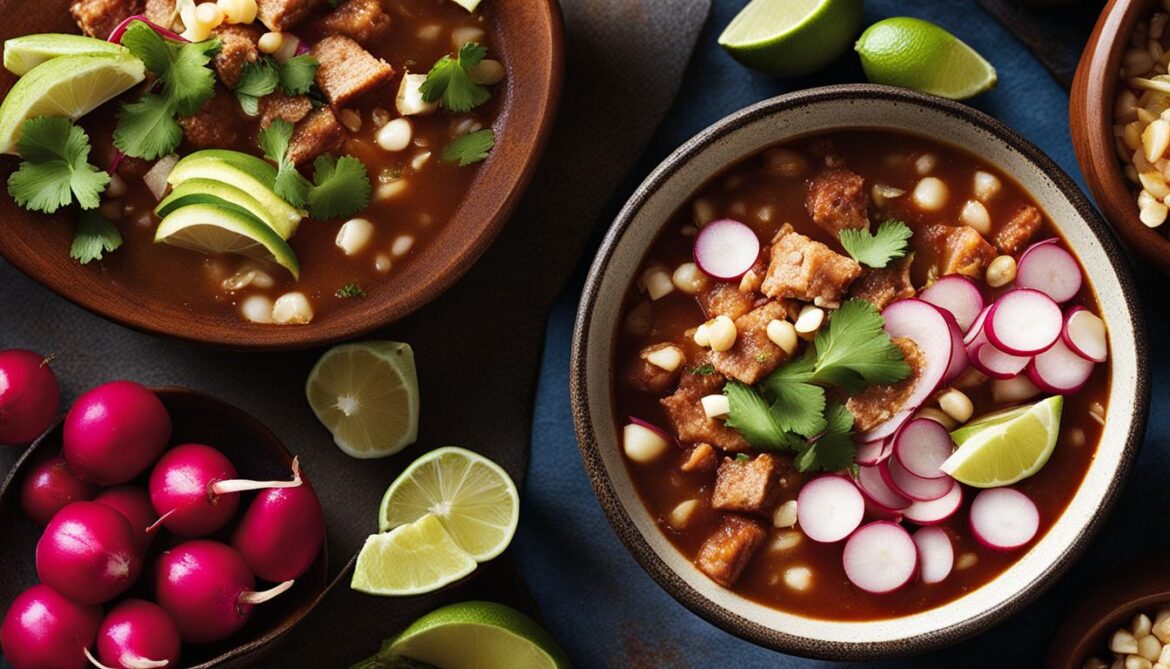Mexican pozole is a traditional dish that holds a significant place in Mexican culture, often enjoyed during celebrations. But is pozole a healthy choice? To fully understand its nutritional value and potential health benefits, let’s dive into the facts.
Key Takeaways:
- Pozole is a traditional Mexican dish enjoyed during celebrations.
- Understanding its nutritional value is crucial in evaluating its health benefits.
- Calorie content in pozole can vary depending on the ingredients and recipe used.
- Pozole is a good source of protein, fiber, vitamins, and minerals.
- There are healthier variations of pozole available, such as using leaner cuts of meat or opting for vegetarian options.
How Many Calories Does Pozole Have?
A one cup serving of pozole can contain anywhere from 200-300 calories, depending on the ingredients and recipe used. The calorie content of pozole can be reduced by making a few simple modifications. Here are some strategies:
Choose Leaner Meats
By using leaner cuts of meat, you can significantly reduce the calorie content of your pozole. Opt for chicken or turkey instead of pork, or consider using tofu or other plant-based protein sources for a vegetarian option.
Go Vegetarian or Vegan
Another way to lower the calorie count of your pozole is by making a vegetable-based version. By eliminating meat altogether, you can reduce the calorie and fat content. Load up on fresh vegetables, such as corn, carrots, and bell peppers, to add flavor and nutritional value to your pozole.
Decrease the Amount of Oil
Pozole typically requires cooking the ingredients in oil. Consider using less oil to reduce the overall calorie content. You can also experiment with alternative cooking methods, such as steaming or baking, to further decrease the calorie count.
Explore Low-Fat Variations
If you’re watching your calorie intake, you’ll be happy to know that there are low-fat variations of pozole available. These recipes often replace high-fat ingredients, such as meat and oil, with healthier alternatives. Look for recipes that use broth or stock as a base and include plenty of vegetables.
By employing these strategies, you can enjoy a lighter and more calorie-conscious version of pozole without sacrificing its delicious flavors. Check out the table below for a comparison of the calorie content of different types of pozole:
| Pozole Variation | Calories per One Cup Serving |
|---|---|
| Traditional Pozole with Pork | 250-300 |
| Chicken Pozole | 200-250 |
| Vegetable Pozole | 150-200 |
| Vegan Pozole | 100-150 |
As seen in the table above, choosing a vegetarian or vegan option can significantly reduce the caloric intake of pozole. It’s important to note that portion sizes and specific ingredients can vary, so it’s always a good idea to check the nutritional information for the exact recipe you’re using.
Pozole Nutrition Facts
When it comes to the nutritional value of pozole, you’ll be happy to know that it packs a healthy punch. One cup of pozole contains approximately 200 calories and 8 grams of protein, making it a satisfying and nourishing meal option. But the benefits don’t stop there.
Pozole is also a good source of fiber, providing you with the digestive support you need to maintain a healthy gut. It is rich in vitamin A, which is essential for good vision and a strong immune system, and vitamin C, which helps boost your overall immunity.
In addition to these vitamins, pozole also contains calcium and iron, two important minerals for maintaining strong bones and promoting oxygen transport throughout your body. And the best part? Pozole is low in saturated fat and sodium, making it a heart-healthy choice for those watching their cholesterol levels and blood pressure.
The Nutritional Content of Pozole at a Glance:
| Nutrient | Amount per 1 cup serving |
|---|---|
| Calories | Approximately 200 |
| Protein | 8 grams |
| Fiber | Varies depending on ingredients |
| Vitamin A | Varies depending on ingredients |
| Vitamin C | Varies depending on ingredients |
| Calcium | Varies depending on ingredients |
| Iron | Varies depending on ingredients |
As you can see, pozole provides a well-rounded nutritional profile, offering an array of important vitamins and minerals. Whether you’re looking to boost your protein intake, increase your fiber consumption, or support your immune system, pozole is a flavorful and nutritious dish that can help you reach your health goals.
Is Pozole Good for You When You’re Sick?
Pozole, a traditional Mexican soup, can be a beneficial choice when you’re feeling under the weather. Not only does it provide comfort, but it also offers potential health benefits. The ingredients found in pozole, such as chicken noodle soup, chilies, and broth, can help soothe sore throats, provide hydration, and even have additional healing properties that aid in sinus clearing and detoxification.
When you’re sick, it’s important to consume foods that are easy to eat and digest, while also providing the necessary nutrients to support your immune system. Pozole fits the bill. The warm and nourishing broth can help alleviate discomfort, and the ingredients used in pozole can provide essential vitamins and minerals to boost your health.
One of the key ingredients in pozole is chicken, which is an excellent source of lean protein. Protein is important for repairing and building tissues, especially when your body is fighting off sickness. Additionally, the chilies used in pozole can help clear congestion, aiding in respiratory health.
Not to mention, the warmth of the soup can help soothe nasal passages and provide relief from symptoms such as coughing, sneezing, and a stuffy nose. Hydration is also crucial when you’re sick, as it helps loosen mucus and keeps your body functioning properly. The broth in pozole, along with the vegetables and other ingredients, can provide necessary fluids and hydration.

When you’re feeling under the weather, it’s important to listen to your body’s needs and consume foods that nourish and support your immune system. Pozole can be a flavorful and nutritious option that provides comfort and potential health benefits when you need it most.
Is Pork Pozole Healthy?
Pork pozole is a popular version of the dish that is often served as a main course. While it can be a delicious and comforting meal, it is important to consider the nutritional content. Pork pozole is high in calories, fat, and sodium, and is not considered to be a very healthy choice. It should be enjoyed in moderation and balanced with other nutritious foods.
To understand the nutritional value of pork pozole, let’s take a closer look at its key components:
Pork:
Pork is the main ingredient in pork pozole and is a significant source of calories and fat. It is important to choose lean cuts of pork and trim any visible fat to reduce the overall fat content. This can help make the dish a bit healthier.
Hominy:
Hominy, a type of processed corn, is commonly used in pozole. It adds texture and flavor to the dish but does not provide significant nutritional benefits.
Broth:
The broth used in pozole can vary in terms of its fat and sodium content, depending on the recipe. It is essential to use low-sodium broth and minimize the use of added fats to keep the overall dish healthier.
Garnishes:
Pork pozole is often served with various garnishes, such as avocado, radishes, lettuce, and lime. While these garnishes can add freshness and flavor to the dish, they should be used in moderation due to their potential high-calorie content.
When enjoying pork pozole, it is important to be mindful of portion sizes and balance it with other nutritious foods. A balanced diet includes a variety of fruits, vegetables, whole grains, lean proteins, and healthy fats. By incorporating these foods into your overall daily intake, you can enjoy pork pozole as part of a balanced and healthy lifestyle.
Remember, moderation is key when it comes to enjoying less healthy foods. It’s all about finding a balance that works for you and your health goals.
Mexican Foods with Nutritional Benefits
Mexican cuisine offers a wide variety of healthy and nutritious foods that can be incorporated into a balanced diet. These ingredients are rich in vitamins, minerals, fiber, and other beneficial compounds. Let’s explore some examples of Mexican foods with nutritional benefits:
1. Chiles
Chiles, such as jalapeños and poblanos, are not only spicy and flavorful but also packed with antioxidants and vitamins. They can boost metabolism and improve digestion.
2. Beans
Beans, including black beans and pinto beans, are an excellent source of plant-based protein, fiber, and essential minerals like iron and potassium. They can lower cholesterol levels and promote heart health.
3. Chia Seeds
Chia seeds are a powerhouse of nutrients, including omega-3 fatty acids, fiber, and antioxidants. They can help with weight management, improve hydration, and support digestive health.
4. Pepitas (Pumpkin Seeds)
Pepitas are packed with protein, healthy fats, and minerals like magnesium and zinc. They can boost immune function, support prostate health, and aid in diabetes management.
5. Pumpkin
Pumpkin is rich in vitamins A and C, as well as antioxidants. It can promote healthy vision, boost immune function, and aid in digestion.
6. Corn Tortillas
Corn tortillas are a staple in Mexican cuisine and provide a good source of fiber, B vitamins, and essential minerals. They are a healthier alternative to flour tortillas and can be enjoyed in various dishes.
7. Jicama
Jicama is a crunchy root vegetable that is low in calories and high in fiber. It is a great source of vitamin C, antioxidants, and prebiotic fiber, which supports a healthy gut.
8. Cinnamon
Cinnamon is a flavorful spice that has anti-inflammatory properties and can help regulate blood sugar levels. It can be added to various Mexican dishes, such as desserts and hot beverages.
9. Cactus
Cactus, also known as nopales, is low in calories and rich in vitamins, minerals, and antioxidants. It can help lower cholesterol levels, improve digestion, and support weight loss.
10. Chocolate
Dark chocolate, which originated in Mexico, is known for its antioxidant properties and potential health benefits. It can improve cardiovascular health, enhance mood, and provide a delicious treat.
By incorporating these nutritious Mexican ingredients into your diet, you can enjoy flavorful meals while reaping the health benefits they offer. Experiment with these ingredients in your favorite Mexican recipes and discover new ways to enhance the nutritional value of your meals.
| Ingredient | Health Benefits |
|---|---|
| Chiles | Boost metabolism, improve digestion, packed with antioxidants and vitamins |
| Beans | Plant-based protein, fiber, lower cholesterol levels, promote heart health |
| Chia Seeds | Omega-3 fatty acids, fiber, antioxidants, weight management, improve hydration |
| Pepitas (Pumpkin Seeds) | Protein, healthy fats, magnesium, zinc, boost immune function, support prostate health, aid in diabetes management |
| Pumpkin | Vitamins A and C, antioxidants, promote healthy vision, boost immune function, aid in digestion |
| Corn Tortillas | Fiber, B vitamins, essential minerals, healthier alternative to flour tortillas |
| Jicama | Low in calories, fiber, vitamin C, antioxidants, prebiotic fiber, support a healthy gut |
| Cinnamon | Anti-inflammatory properties, regulate blood sugar levels |
| Cactus | Low in calories, vitamins, minerals, antioxidants, lower cholesterol levels, improve digestion, support weight loss |
| Chocolate | Antioxidant properties, improve cardiovascular health, enhance mood |
How to Make Pozole Healthy
Making pozole healthy is easier than you might think. Whether you prefer a traditional recipe or want to explore vegan options, there are various ways to modify this delicious Mexican dish while still maintaining its authentic flavors. By making mindful choices when selecting ingredients and cooking methods, you can create a nutritious and wholesome version of pozole that you’ll love.
Choosing the Right Ingredients
Start by selecting lean cuts of meat, such as boneless chicken breasts or turkey, instead of fatty pork. This will help reduce the calorie and fat content of the dish while still providing a good source of protein. You can also opt for vegetarian or vegan versions of pozole by using ingredients like beans, tofu, or textured vegetable protein (TVP). These alternatives are not only healthier but also cater to different dietary preferences.
Incorporating More Vegetables
Vegetables are a fantastic way to add more nutrients and fiber to your pozole. Increase the vegetable content by adding a variety of colorful options such as carrots, bell peppers, zucchini, and spinach. These vegetables not only enhance the nutritional value of your dish but also provide a refreshing crunch and vibrant flavors.
Reducing Oil and Sodium
To make your pozole healthier, reduce the amount of oil used in the recipe. Instead of frying the ingredients, opt for sautéing them using minimal oil or consider baking or grilling the meat for a lighter option. Additionally, be mindful of the sodium content by using low-sodium or no-salt-added broth and seasonings. This will help control your sodium intake without compromising the taste.
Exploring Homemade Pozole Recipes
There are countless homemade pozole recipes available that provide healthier variations of this classic dish. These recipes often prioritize fresh, whole ingredients and offer alternatives for different dietary needs. Experiment with different spice blends, toppings, and broth bases to find the combination that suits your taste and health goals. You can also consider incorporating superfoods like chia seeds or avocado as nutritious garnishments.
By following these tips and exploring homemade pozole recipes, you can enjoy this beloved Mexican dish while ensuring it aligns with your healthy lifestyle. Whether you’re looking for a traditional pozole recipe, a vegan alternative, or ways to reduce calories and fat, there’s something for everyone when it comes to making pozole healthy.
Conclusion
Mexican pozole is a delicious and nutritious dish that can be a healthy choice when consumed in moderation. It is packed with protein, fiber, vitamins, and minerals, making it a beneficial addition to a balanced diet. By making wise choices in ingredient selection and cooking methods, you can create a healthier version of pozole without compromising its flavor and authenticity.
Whether you opt for the traditional recipe or choose to modify it to suit your dietary needs, pozole can provide several health benefits. It can help support your immune system, aid in digestion, and provide necessary nutrients. However, it is important to be mindful of the amount of calories, fat, and sodium in certain variations, such as pork pozole.
When making pozole at home, consider using leaner cuts of meat or opting for vegetarian or vegan options. You can also increase the amount of vegetables and reduce the oil content to make it even healthier. Exploring different recipes and experimenting with nutritious ingredients will allow you to enjoy the flavors of pozole while maintaining a well-rounded diet. So go ahead and savor the taste of this iconic Mexican dish knowing that it can be a nutritious and satisfying choice.
FAQ
Is pozole healthy for you?
Pozole can be a healthy choice when made with nutritious ingredients and enjoyed in moderation. It is a good source of protein, fiber, vitamins, and minerals.
What are the nutritional facts of traditional pozole?
A one cup serving of pozole can contain anywhere from 200-300 calories, depending on the ingredients and recipe used. It is also a good source of fiber, vitamin A, vitamin C, calcium, and iron. Additionally, pozole is low in saturated fat and sodium.
How many calories does pozole have?
Depending on the ingredients and method of preparation, a one cup serving of pozole can contain approximately 200 calories. There are also low-fat variations of pozole available for those looking to reduce their calorie intake.
Are there any health benefits of pozole?
Pozole can provide hydration and soothe sore throats when you’re sick. The ingredients in pozole, such as chicken noodle soup, chilies, and broth, can have additional healing properties and help with sinus clearing and detoxification.
Is pork pozole healthy?
Pork pozole is high in calories, fat, and sodium, and is not considered to be a very healthy choice. It should be enjoyed in moderation and balanced with other nutritious foods.
What are some Mexican foods with nutritional benefits?
Mexican cuisine offers a wide variety of nutritious foods, such as chiles, beans, chia seeds, pepitas (pumpkin seeds), pumpkin, corn tortillas, jicama, cinnamon, cactus, and chocolate. These ingredients are rich in vitamins, minerals, fiber, and other beneficial compounds.
How can I make pozole healthy?
You can make pozole healthier by using lean cuts of meat, opting for vegetarian or vegan versions, reducing the amount of oil used, and increasing the vegetable content. There are many recipes available that provide healthier variations of pozole.
Is pozole a good choice if I want to maintain a balanced diet?
When enjoyed in moderation and made with nutritious ingredients, pozole can be a good choice as it is a good source of protein, fiber, vitamins, and minerals. It can be a delicious and nutritious addition to your menu.







